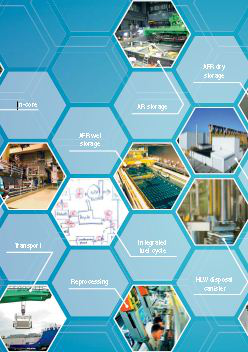Speakers
Dr
Andrew Newman
(Nuclear Threat Initiative)Prof.
Thomas Isaacs
(Nuclear Threat Initiative)
Description
Despite well-developed repository programs in Sweden, Finland and France, and encouraging progress in several other countries including Canada, the vast majority of states – including the U.S. – continue to struggle developing and implementing timely plans to safely and securely dispose of spent fuel and high level waste produced by nuclear power programs. Spent fuel continues to accumulate in cooling pools with limited storage capacity. On-site dry cask storage is a longer-term, but still temporary, solution and reprocessing generates significant waste streams that require geologic disposal.
The lack of spent fuel management options strains the credibility of the nuclear community and undercuts public and political acceptance for current and future nuclear activities. It is unethical, irresponsible and ultimately unsustainable to push the problem onto future generations. It is also a proliferation and security issue. The decisions that countries make on the back end of the fuel cycle (activities that could include dry cask storage, shipping spent fuel to away-from-reactor storage or to reprocessing plants and, eventually, the final disposal of spent fuel or high level waste) can include sensitive nuclear technologies such as plutonium separation.
Drawing on two years of work funded by the Hewlett and MacArthur Foundations, the principal investigators offer recommendations for developing spent fuel pathways that address broader fuel cycle concerns. Key findings include:
• many countries face storage and disposal siting challenges. This is particularly true in countries such as Japan and South Korea, where the need is urgent and growing.
• cooperative networks and regional frameworks for storage and disposal could be a productive way to address these problems in Asia and elsewhere. Such partnerships can enhance regional transparency and flexibility as well as improving global security and fortifying nonproliferation.
• the possibility of multinational options should not be used as an excuse for countries to neglect domestic responsibilities; all countries must have a national spent fuel management program. Conversely, national programs should not oppose concerted exploration of multinational approaches.
• geological disposal can be both a business venture and a public service. Even one success story could be a game changer, prompting regional waste management solutions in other parts of the world.
• many nations with spent fuel management issues state that sustained U.S. engagement in regional fuel cycle/spent fuel initiatives is necessary.
• many productive avenues of discussion can be pursued immediately that promote cooperation well before the difficult phase of repository siting.
Country/ int. organization
United States/Nuclear Threat Initiative
Author
Dr
Andrew Newman
(Nuclear Threat Initiative)
Co-author
Prof.
Thomas Isaacs
(Nuclear Threat Initiative)

